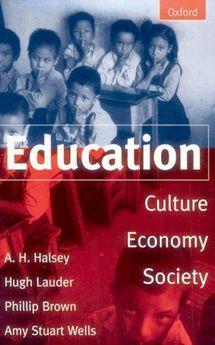1Introduction: The Social Transformation of Education and Society
Part One: Education, Culture, and Society
2The Forms of Capital
3Class and Pedagogies: Visible and Invisible
4Social Capital in the Creation of Human Capital
5The Post-Modern Condition
6Crossing the Boundaries of Educational Discourse: Modernism, Postmodernism, and Feminism
7Having an Postmodernist Turn or Postmodernist Angst: A Disorder Experienced by an Author Who is Not Yet Dead or Even Close to It
8Feminisms and Education Gaby Weiner
Part Two: Education, Global Economy, and Labour Market
9Why the Rich are Getting Richer and the Poor, Poorer
10Education, Globalization, and Economic Development
11The New Knowledge Work
12Education, Skill Formation, and Economic Development: The Singaporean Approach
13 Human Capital Concepts
14The Gendering of Skill and Vocationalism in Twentieth-Century Australian Education
15Can Education Do It Alone?
Part Three: The State and the Restructuring of Teachers' Work
16Education and the Role of the State: Devolution and Control Post-Picot
17The Global Economy, the State, and the Politics of Education
18Educational Achievement in Centralized and Decentralized Systems
19On the Changing Relationships Between the State, Civil Society, and Changing Notions of Teacher Professionalism
20Changing Notions of Educational Management and Leadership
21Assessment, Accountability, and Standards Using Assessment to Control the Reform of Schooling
22Restructuring Schools for Student Success
23Restructuring Restructuring: Postmodernity and the Prospects for Educational Change
Part Four: Politics, Markets, and School Effectiveness
24Politics, Markets, and the Organization of Schools
25Education, Democracy, and the Economy
26The `Third Wave': Education and the Ideology of Parentocracy
27Circuits of Schooling: A Sociological Exploration of Parental Choice of School in Social Class Contexts
28African-American Students' View of School Choice
29Choice, Competition, and Segregation: An Empirical Analysis of A New Zealand Secondary School Market, 1990-93
30[Ap]parent Involvement: Reflections on Parents, Power, and Urban Public Schools
31Can Effective Schools Compensate for Society?
Part Five: Knowledge, Curriculum, and Cultural Politics
32Introduction: Our Virtue
33The New Cultural Politics of Difference
34On Race and Voice: Challenges for Liberal Education in the 1990s
35The Silenced Dialogue: Power and Pedagogy in Educating Other People's Children
36What Postmodernists Forget: Cultural Capital and Official Knowledge
37The Big Picture: Masculinities in Recent World History
38Is the Future Female? Female Success, Male Disadvantage, and Changing Gender Patterns in Education
Part Six: Meritocracy and Social Exclusion
39Trends in Access and Equity in Higher Education: Britain in International Perspective
40Education and Occupational Attainments: The Impact of Ethnic Origins
41Problems of `Meritocracy'
42Equalization and Improvement: Some Effects of Comprehensive Reorganization in Scotland
43Social Class Differences in Family-School Relationships: The Importance of Cultural Capital
44The Politics of Culture: Understanding Local Political Resistance to Detracking in Racially Mixed Schools
45Cultural Capital and Social Exclusion: Some Observations on Recent Trends in Education, Employment, and the Labour Market
46Studying Inner-City Social Dislocations: The Challenge of Public Agenda Research
47Racial Stratification and Education in the United States: Why Inequality Persists
48The Bell Curve Wars
49The Family and Social Justice
